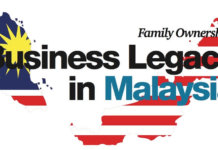Entrepreneurship and Family Business are two topics known to be closely intertwined. This bond is best exemplified by the entrepreneurial spirit family business founders demonstrate when building internationally lucrative conglomerates. This drive often calls to mind the hard won past of family- owned companies and how they have led to their ultimate success. Yet, the emphasis paid to the laborious entrepreneurial efforts of a family business’ first generation should be maintained in order for next generations to sustain continued success. Kurt Wee, Vice President, Awards & Projects for the Association of Small and Medium Enterprises (ASME), Singapore, speaks to Tharawat about why the relationship between entrepreneurship and family business becomes more and more important from one generation to the next. Wee goes further to highlight ASME’s Entrepreneur of the Year Sub-Category Award – EYA for Gen Z, a recently launched accolade for highlighting the achievements of second and third generation entrepreneurs in family businesses.
Q: How would you describe family businesses in Singapore? What is unique about them?
A: Many of the family businesses in Singapore are built on traditional business practices and models, good working relations and strong values such as humility, hard work and determination. The unique characteristic of these family businesses is how they are passed on from generation to generation, how fathers introduce their sons to suppliers and customers, and how the new generation takes over the business and strategically brings it to greater heights in the modern business world. For many of the second and third generation entrepreneurs, the challenge is to transform their family-run business into a professional enterprise. We also observed that family businesses generally have a tendency to put greater efforts into contributing and giving back to society via their CSR initiatives.
Q: How do you see the relationship between entrepreneurship and family firm?
A: Entrepreneurship and family business stand in clear relation to each other: The passing of the entrepreneurial spirit from one generation to the next, meeting of family needs and fuelling the desire to expand and elevate the current business to new heights for the next generation, are all ways in which entrepreneurship benefits the family business.
Q: What are the advantages experienced by entrepreneurs that come from a family business background?
A: These entrepreneurs naturally have a booster start, and are able to receive mentorship from their family. However, despite their natural status born as a boss’ son/ daughter, many of these successful entrepreneurs have to work their way up the ranks and learn the ropes of the trade from scratch. They are all personally involved in the day-to-day operations as well as the front-to-back end operations of the business. For example, some of these entrepreneurs come into the company as workers, drivers and take on roles from the ground, hiding their identity as the boss’ son or daughter. Through this practice, many of them are able to gather and understand sentiments from the bottom up, grasp the operations, understand competitors better, and hence, able to effectively expand and diversify their family business. In addition, these entrepreneurs embrace and hold on to the traditional values that their family has passed on to them, which has enabled them to become successful entrepreneurs in today’s context.
Q: ASME has launched the Gen Z Award for the Annual Entrepreneur of the Year to recognise 2nd and 3rd generation family business successors: What are the main reasons behind this?
A: The main reasons behind the Gen Z sub-category award is to recognise and reward exceptional second or even third generation business successors who have taken an existing business to the next level, paving the way for the company’s future growth, sustainability and relevance to their target market and industry. As the current image of the Entrepreneur of the Year Award is portrayed as an Award for traditional businessmen, this new sub-category will spur up-and- coming business leaders to take part. This award will undoubtedly be great motivation to young business leaders, giving them a well-needed push in the right direction.
Q: In your experience, how can family businesses identify entrepreneurial traits in the next generation? What makes these entrepreneurs succeed?
A: By exposing the next generation to the rudiments and inner workings of a family business at a young age, that spark of entrepreneurial spirit can be identified and then cultivated. Of course, the next generation must have the aptitude and attitude to continue the business, and must show a desire to learn and then take the business to the next level. Many of the businesses I’ve come across let the new potential heads of the company begin in minor roles within the organisation, in order for them to slowly learn the ropes of that particular business before finally taking the helm. This can take months or even years, but is an invaluable experience that will help the new business successor to truly appreciate the full spectrum of the business, not just from the top down. It is this teaching-by-doing trait that is prevalent amongst family businesses, guiding entrepreneurs to stellar success.
Q: Based on the cases that you have observed over the years, how can families encourage entrepreneurial initiative in their next generations?
A: It is never easy to start a business, but families can encourage entrepreneurship within their children by first allowing them glimpses of the company, and gradually allowing the next generation to have a hand in the business. By doing actual work and experiencing it for themselves, the eventual business successors will want to see the business go further, go higher, and will want to put their modern perspectives and courses of action into place. They have to start young, to instill critical entrepreneurial values within the children. In any case, the core entrepreneurial traits like hard work, determination, and perseverance will be beneficial to those individuals no matter where they end up.
Tharawat Magazine, Issue 16, 2012
















